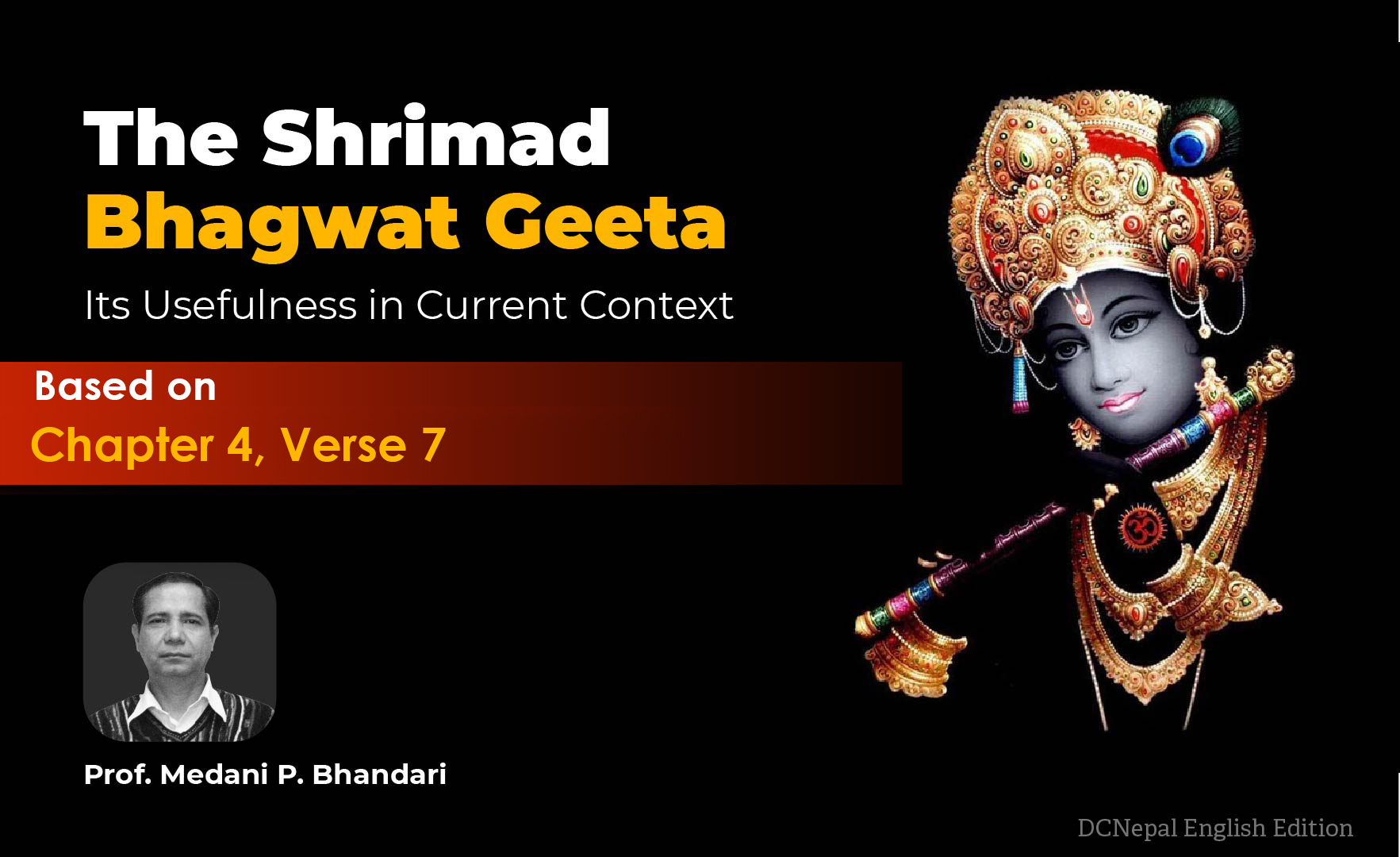Relevance of Chapter 4, Verse 7 in the Shrimad Bhagwat Geeta for the Modern Context

यदायदाहिधर्मस्यग्लानिर्भवतिभारत।अभ्युत्थानमधर्मस्यतदात्मानंसृजाम्यहम्॥
“Whenever there is a decline in righteousness and an increase in unrighteousness, O Arjuna, at that time I manifest Myself on earth.”
In the previous chapters of our exploration into the timeless teachings of the Bhagavad Gita, we have uncovered profound insights that guide us towards living a purposeful and balanced life. In Chapter 2, Verse 47, we delved into the essence of right to perform duties, detachment from results, non-doer-ship, and the importance of duty, which illuminate the path of equanimity in action. Likewise, Chapter 2, Verse 50 offered valuable wisdom on cultivating equanimity, embracing selfless action, surrendering the results, developing wisdom, practicing mindfulness, nurturing a devotional spirit, leading a balanced life, and seeking inner fulfillment.
Now, as we venture into Chapter 4, Verse 7, we explore the significance of surrender in our peaceful day-to-day existence. This verse reveals a divine promise, where the Supreme Being incarnates on earth whenever righteousness declines and unrighteousness prevails. Understanding the importance of surrender becomes crucial as we navigate the challenges of life, seeking solace and guidance in times of moral turmoil.
In this chapter, we will dive into the essence of surrender and its transformative power in finding inner peace amidst the ebb and flow of life’s uncertainties. By contemplating this verse, we hope to unravel the profound teachings that inspire us to surrender to a higher purpose, embrace a life guided by righteousness, and cultivate an unwavering connection with the divine. Join us on this journey as we uncover the keys to a peaceful and meaningful existence through wisdom. The verse holds profound significance, as it portrays the concept of divine intervention during times of moral decline and unrighteousness. Lord Krishna, the charioteer, and spiritual guide of Arjuna, reveals this truth, explaining how the divine descends to restore righteousness and guide humanity back on the path of dharma (righteousness).
Throughout history, there have been numerous instances where the world witnessed a decline in ethical and moral values, leading to chaos, injustice, and suffering. During such critical periods, divine incarnations or avatars have appeared on earth to uphold righteousness, protect the virtuous, and correct the course of society.
The most prominent divine manifestation
One of the most prominent examples of divine manifestation is Lord Krishna himself. In the Mahabharata, the setting of the Bhagavad Gita, the Kuru dynasty faced a crisis with the Kurukshetra War, fueled by greed, power struggles, and moral degradation. Krishna’s incarnation as a human was a response to the decline in righteousness (dharma) and the rise of unrighteousness (adharma). He played a pivotal role in guiding Arjuna and the Pandavas on the path of duty and righteousness.
Similarly, in Hindu mythology, Lord Rama’s incarnation in the Ramayana occurred during a time of moral degradation and tyranny, where the demon king Ravana oppressed the innocent. Lord Rama’s divine presence brought about the restoration of dharma and the triumph of righteousness over evil.
Outside Hinduism, various religious traditions also describe the concept of divine interventions during times of crisis. In Christianity, the belief in the Second Coming of Jesus Christ is rooted in the idea of his return to restore justice and establish a reign of righteousness.
In Hindu mythology, divine personalities, noble sages, scholars, sadhus, and gurus are believed to hold the power of God, regardless of their religious affiliation. This belief stems from the concept of divinity being omnipresent and transcending religious boundaries. These revered figures are seen as embodiments of divine wisdom, compassion, and spiritual realization, guiding individuals towards a deeper understanding of life and the universe. The recognition of divinity in all beings reflects the inclusive and universal nature of Hindu philosophy, where the essence of God is perceived as present in every living being and spiritual seeker, regardless of their religious identity.
Importance in Current Context- Verse 7
The concept of divine manifestation in times of moral decline serves as a beacon of hope for humanity. It reminds us that in the face of adversity and darkness, there is a higher force that watches over and guides us towards righteousness. These divine incarnations demonstrate that even during the darkest moments, there is the potential for transformation and renewal, inspiring individuals to uphold moral values and contribute to a more just and harmonious society.
In our own lives, we may witness moments of moral decline, whether in our communities, institutions, or even within ourselves. The verse encourages us to seek guidance from our inner divinity and strive to act in alignment with righteousness. By embodying virtues such as compassion, honesty, and selflessness, we can play our part in creating a world where the divine presence is reflected in our thoughts, words, and deeds.
The meaning and main message of the verse
The verse conveys a powerful message about divine intervention during times of moral decline and unrighteousness. The verse teaches us that whenever there is a prevalence of unrighteousness and a decline in moral values, the divine manifests itself on earth to restore righteousness and guide humanity back onto the path of dharma.
In the face of turmoil and challenges such as wars, climate change, hunger, and loss of humanity in society, this verse provides several essential lessons and insights:
Recognition of Moral Decline: The verse reminds us to be vigilant and aware of the signs of moral decline. By recognizing the erosion of ethical values and social harmony, we can take proactive steps to address these issues.
Divine Guidance: The verse instills hope that divine intervention is present during tumultuous times. This reassurance can serve as a source of strength and solace as we face adversity, knowing that there is a higher force guiding us towards righteousness.
Emphasis on Righteous Action: The verse encourages us to uphold moral values and act in accordance with dharma. In the face of societal challenges, our individual actions play a crucial role in creating positive change.
Collective Responsibility: This verse underscores the collective responsibility of humanity in restoring righteousness. By coming together, we can address issues like climate change and hunger, fostering a sense of solidarity and shared purpose.
Harmonious Relationships: To create harmony among us and with nature, we must prioritize empathy, compassion, and understanding. Recognizing the interconnectedness of all living beings, we can promote respect for each other and the environment.
Social Engagement: The verse calls for active engagement in addressing societal problems. It reminds us that we must not remain passive observers but actively contribute to building a just and compassionate world.
Inner Transformation: To cope with turmoil, it is crucial to undergo inner transformation. By cultivating inner virtues like love, kindness, and forgiveness, we can create a ripple effect of positive change in society.
In the face of the challenges, we are facing now and in the foreseeable future, this verse serves as a guiding light. It calls us to action, inspiring us to be agents of positive change, both in our immediate communities and on a global scale. By embracing the teachings of the verse and taking responsibility for our actions, we can collectively create a harmonious relationship among ourselves and with nature, contributing to a more compassionate, just, and sustainable world.
Conclusion
I think the verse imparts invaluable lessons that are highly relevant to the challenges we face today and in the foreseeable future. As we navigate issues like wars, climate change, hunger, and the erosion of humanity in society, this verse offers profound insights to guide our actions and mindset.The recognition of moral decline serves as a wake-up call, urging us to address ethical lapses and social disharmony. By acknowledging the need for change, we can work towards restoring righteousness in our communities and beyond.
The assurance of divine guidance instills hope and faith during tumultuous times, reminding us that there is a higher force guiding us towards righteous paths. This belief can serve as a pillar of strength as we face adversity and strive for positive change. Emphasizing righteous action, the verse encourages us to act ethically and compassionately, making a positive impact on the world around us. Our individual actions collectively shape the course of society, highlighting the power of responsible choices.
The verse calls for collective responsibility, urging us to come together to address global challenges. By fostering unity and cooperation, we can find collective solutions to issues like climate change and hunger. Harmonious relationships with others and with nature are key to creating a sustainable world. Prioritizing empathy, understanding, and respect for all living beings fosters a sense of interconnectedness and global citizenship. Social engagement, complemented by inner transformation, plays a pivotal role in creating positive change. By cultivating inner virtues and aligning our actions with compassion and love, we can be catalysts for positive societal transformation.
Implementing the philosophy of Bashudaiva Kutumbakkam, where we view the world as one family, and living and letting others live, fosters a culture of peace, inclusivity, and coexistence. By promoting tolerance and understanding, we pave the way for a harmonious world where diversity is celebrated.
In these challenging times, the verse from the Bhagavad Gita provides us with a roadmap for creating a better world. It calls upon us to recognize our shared humanity, embrace our collective responsibilities, and cultivate compassion and empathy. By infusing our actions with the principles of righteousness and selflessness, we can foster harmonious relationships among ourselves and with nature. Together, we can make a profound impact on the world and pave the way for a more just, sustainable, and compassionate future.
Note: Next paper will be on Chapter 9, Verse 22: अनन्याश्चिन्तयन्तोमांयेजनाःपर्युपासते।
Thank you.
Facebook Comment
latest Video
Trending News
- This Week
- This Month

















